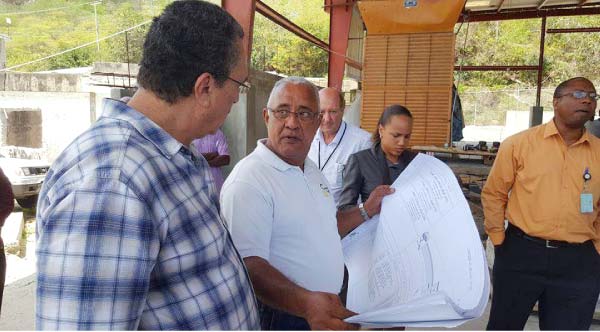
PRIME Minister and Parliamentary Representative for Vieux Fort South, Dr. Kenny Anthony has welcomed a new investment into the town.
Caribbean Grains Flour Mill, which proposes to employ over 100 persons upon completion, is currently under construction at the Vieux Fort Seaport. According to the Prime Minister, this is a major boost for the south of the island.
Dr. Anthony said: “I welcome this investment, particularly because of the job opportunities it presents now and in the future. Over the years, we have had the challenge of dealing with unemployment in Vieux Fort, particularly as most of our factories have closed and moved overseas on the grounds that costs of operation in Saint Lucia are prohibitive. The challenge then has been to find alternatives and to attract investors to the south of the island.
During his constituency day on Wednesday, the Prime Minister toured the construction site and was briefed of the current status of the project.















Only now???? F…k off tan kenny. Borbolist
One hundred plus jobs in this dismal economic climate is nothing to sneeze at, and is good for those who may get any of it. However, the announcement. of this “investment” raises waving bristles of question marks.
First, in another forum, the “investment” is reported as helping to make Saint Lucia self-sufficient. This perhaps is the weakest argument for the establishment of a flour mill at this point in time. Let us take a look.
Self-sufficiency presupposes that it replaces our imports of flour or whatever, that it is supposed to make us self-sufficient in, and that is the rub. Very careful economic thought is required here.
What percentage of local materials goes into this production effort? Granted the fact that the business may well benefit, or come in for tax concessions of some kind, granted its location, (albeit this ensures a reduction in local transportation cost), this means that there is some element of a domestic subsidy or subsidized production. If this is so, there may be a humber of yellow flags and alarm bells from the IMF country visitors and from CARICOM producers of a similar competitor product.
Granted the fact that at least 101 persons will be employed, under full operation, the economics of the situation suggests that the remainder of the country will be, like STEP, subsidizing in some way, the employment of those 101 persons. Is there significant technology or innovation transfer to justify this?
Granted too, the vagueness of when the full complement of 101 plus persons will become employees, this investment remains, up to now, an unfulfilled promise. And still at this point in time, we do not know how many managers, forklift operators, packers and so on will be employed. The nature and calibre of labour force or workforce participation is also important. This is just like the workers in the hotel and hospitality industries are today. Such matters are buried in the rhetoric of “jobs. jobs., jobs”.
Nonetheless, the still larger issues are the age of the production equipment and market share of the output from this outfit. If the factory equipment is not the latest and greatest technology, then it may well be second-hand equipment with previous zero book value on the part of the seller of the equipment. This has implications for product quality, reliability, and equipment maintenance issues.
If the equipment has underutilized capacity in terms domestic output and the size of the domestic market, then it means that unit costs per pound of product will be higher than what could be obtained with full capacity, which can only be lowered by product exports. The economies of scale loom large regarding this argument, meaning, domestic end-users of product output from this factory will be subsidizing (overpaying at the individual level) to keep this factory viable, in a situation of any existing surplus capacity.
If a regional market is sought, with significant raw material input, the CARICOM RULES OF ORIGIN will kick in at this juncture too. Should operations hurdle past these smell test challenges and costs, then the investment will have done well not to burden the country with additional net foreign exchange costs, and then subsidies that exceed the CIF (cost, insurance and freight) of the importation costs of the end-product. But if costs are not lowered, then it can be said to honestly that this venture represents less of an exercise in self-sufficiency, and more correctly resembles at present, the old discredited socialist inefficiency (the commanding heights argument) of import substitution.